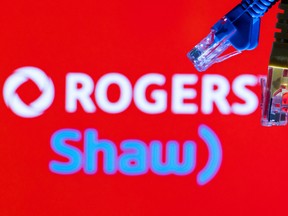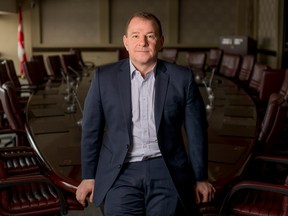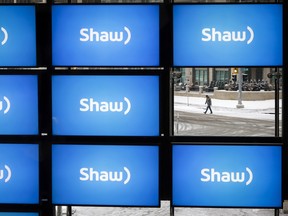Article content
Competition Commissioner Matthew Boswell was flattened by the Competition Tribunal over the holidays.
Current laws and procedures consistently favour the interests of corporations over citizens

Competition Commissioner Matthew Boswell was flattened by the Competition Tribunal over the holidays.
Story continues below
The three-person court rejected outright Boswell’s request for a “full block” of Rogers Communications Inc.’s acquisition of Shaw Communications Inc., and instead concluded that the transaction could be good for competition because it would end up empowering Quebecor Inc., which is standing by to purchase Freedom Mobile from Shaw.
As a result, the Competition Bureau could be on the hook for $20 million in legal fees, which Rogers and Shaw described as “modest” given the stakes: a transaction valued at $26 billion and a break fee of $1.2 billion that the companies said was “hanging in the balance,” and the $250 million in additional financing costs that Rogers might have to pay because of Boswell’s “insistence on litigating every aspect of the proposed transaction and insisting that it be fully blocked.”
Story continues below
Yet Boswell isn’t giving up. He said he would appeal the tribunal’s decision, even though the ruling was unequivocal in its rejection of his contention that allowing Rogers to further consolidate the telecommunications industry “would substantially prevent or lessen competition in wireless service.”
Rogers and Shaw accused Boswell of “intransigence.” Maybe. You could also call it courage, because Boswell’s willingness to stand up to corporate power exemplifies the spirit that people expect from their competition watchdog.
The decision to allow Rogers buy Shaw rests with Industry Minister François-Philippe Champagne, who tweeted on New Year’s Eve that he would decide once there is “clarity on the ongoing legal process.”
Story continues below

But Boswell has put Champagne in an awkward spot. The minister promised in October to “never waver in (his) commitment to promote competition and make wireless services more affordable for all Canadians,” and he said he wouldn’t allow the transfer or wireless licences to Rogers from Shaw. But he indicated that he was open to the actual deal on the table, which involves appeasing Ottawa’s competition concerns by selling Shaw’s Freedom Mobile assets to Quebecor Inc.
“What remains before me is the separate request to transfer spectrum licences from Shaw to Quebecor,” Champagne tweeted. “Promoting competition and affordability in the telecom sector is one of my top priorities. That position has not changed.”
Story continues below
On Dec. 30, the Competition Bureau indicated that it had filed an appeal to the tribunal’s decision, and on Jan. 2 it tweeted that the Federal Court of Appeal had issued an emergency suspension of the tribunal’s decision until the bureau’s application for an injunction can be heard.
The Competition Tribunal’s decision late on a Thursday before a long holiday weekend looked rushed and evasive, and the tone was sneering. The tribunal rejected arguments made by experts and witnesses on behalf of the bureau’s argument, and chided the competition commissioner for challenging the entire merger, rather than the amendment of Freedom’s sale to Quebecor, which happened after the process had begun.
The tribunal acted like a contemptuous know-it-all. The panel accepted as a matter of faith that Quebecor would use the Freedom assets to seek market share in other provinces as vigorously as it has on its home turf of Quebec, the only province where the company currently deploys telecommunications and wireless services at scale. It dismissed the Competition Bureau’s entirely legitimate concern that the merger will “likely result in consumers paying significantly higher wireless prices.”
Story continues below

Much like the calculated scheduling of a celebrity divorce announcement, the Competition Tribunal posted an Information Note on its website on the night of Dec. 29, breaking the news of its decision that the proposed merger of Rogers with Shaw was “not likely to result in materially higher prices, relative to those that would likely prevail in the absence of the arrangement.” (The full ruling followed on Jan. 2, a statutory holiday.)
This, after pledging to give Canadians 48 hours’ notice of a decision on the biggest transaction it had ever adjudicated. Some have pointed out that the tribunal’s timeline played into the preferences of the merging parties, and others have gone so far to say that the tribunal has “shamed itself.”
Story continues below
The unusual timing of the decision, coupled with the rushed nature of the hearings, created the impression that the concerns of everyday people don’t matter.
Many wireless users are concerned their monthly bills will continue to incrementally rise. The latest Statistics Canada inflation report already noted that prices for cellular services rose two per cent in November from a year earlier because there were fewer promotions on offer this year.
But the message of the tribunal’s decision is that such concerns are irrational. Ditto other questions, such as the possibility of layoffs and a reduction in system resiliency. The reality is that our tribunal process is built on complicated mathematics that leaves no room for such considerations. As a result, it is extinguishing business dynamism in Canada and passively facilitating the concentration of our industries.
Story continues below
In fact, the tribunal scoffed at everyday people during the hearing itself, complaining that too many were taking the time to voice their concerns by writing to the Competition Bureau and/or the tribunal. In any other democratic process, such engagement would be celebrated. But instead it was dismissed and shut down. Further, a hearing that was “open” to anyone often shunned members of the public who took the time to follow along, leaving them locked out of a Zoom room with a blank screen while deliberations went in-camera.




Story continues below
But there is no need to let a fatalistic spirit characterize this historic decision. So much can be done with the energy that inspired those people to make their voices heard, and that made the merger such a subject of mockery on social media.
Consumers can send modest signals and switch from Rogers. They can channel their complaints, ideas, and memes to the currently ongoing consultation on the Future of the Competition Policy in Canada, ensuring the government hears from a broad cross-section of the country instead of the usual suspects.
There seems to be political appetite for more action on competition. Two different parliamentary committees — Heritage and Industry — already recommended against the merger. And we have the courageous competition commissioner, who will no doubt continue to appropriately challenge corporate Canada’s appetite for acquisition, even when such challenges may appear quixotic in hindsight.
Story continues below
We should be as hasty as the tribunal has been and accelerate Canada’s competition moment, seizing the opportunity for legislative reform and pushing political actors to make good on it quickly. It is clear that the public interest will not be upheld by current laws and procedures that consistently favour the interests of corporations over citizens.
Correction: Due to an editing mistake, an earlier version of this story incorrectly stated that the tribunal called the competition commissioner “unreasonable” and “intransigent,” described the legal fees as “modest,” and said the Rogers-Shaw transaction was “hanging in the balance.” These quotations were from the cost submission filed by Rogers, Shaw and Quebecor. The Financial Post regrets the error.
Vass Bednar is an adjunct professor of political science at McMaster University and executive director of the school’s Master of Public Policy in Digital Society program.
Story continues below